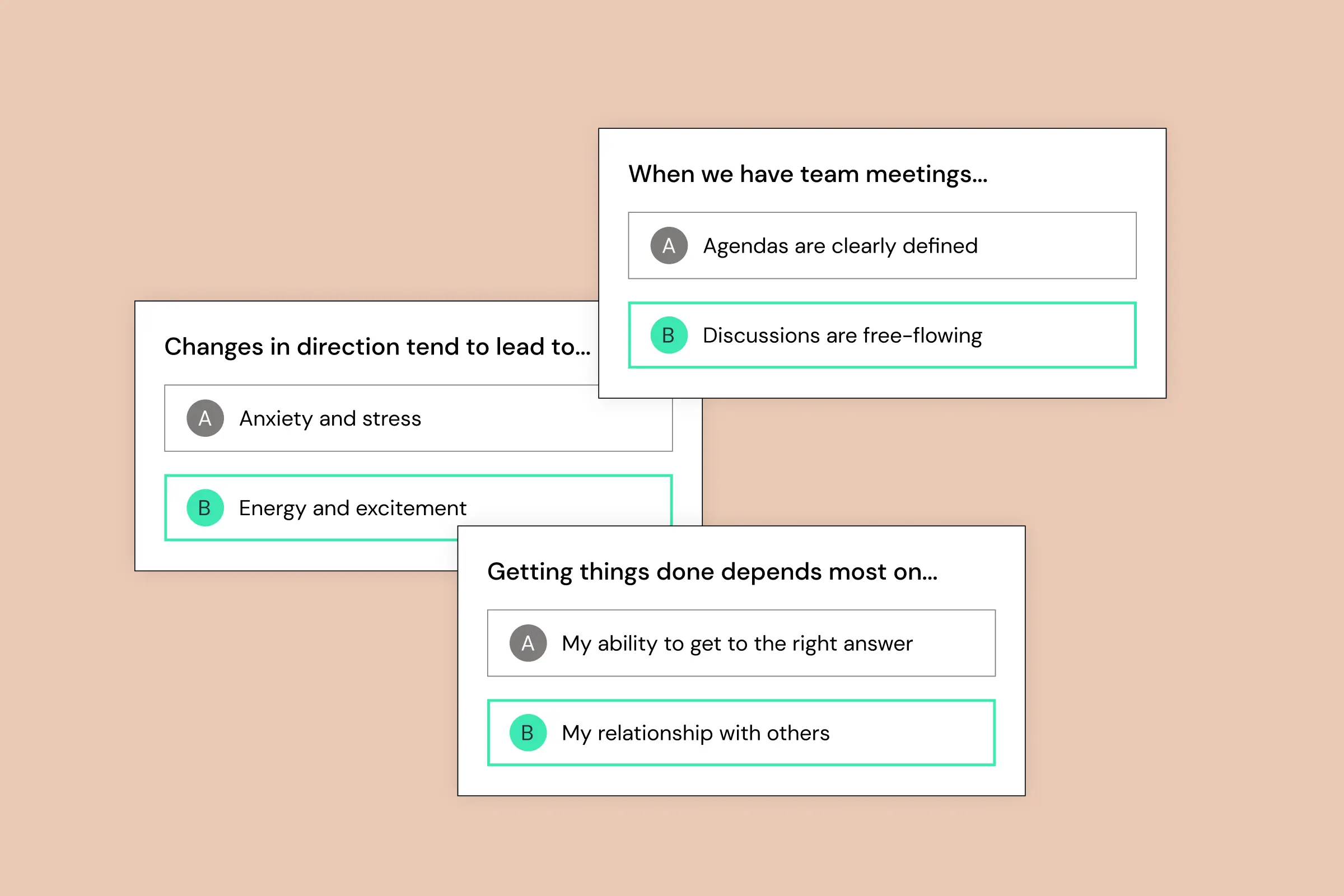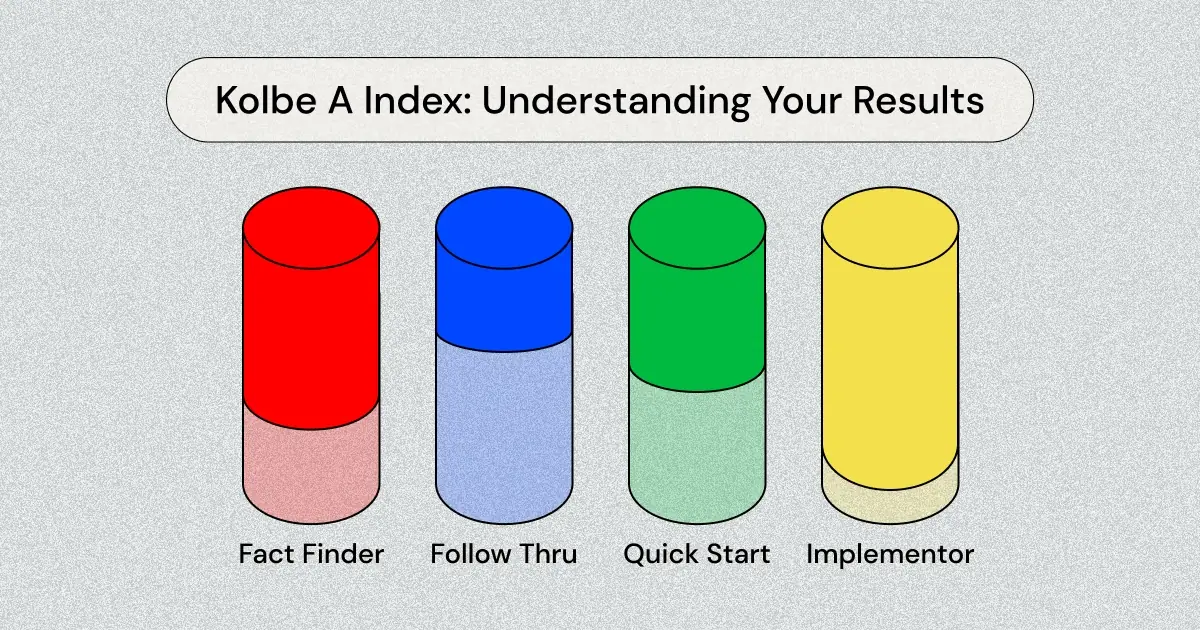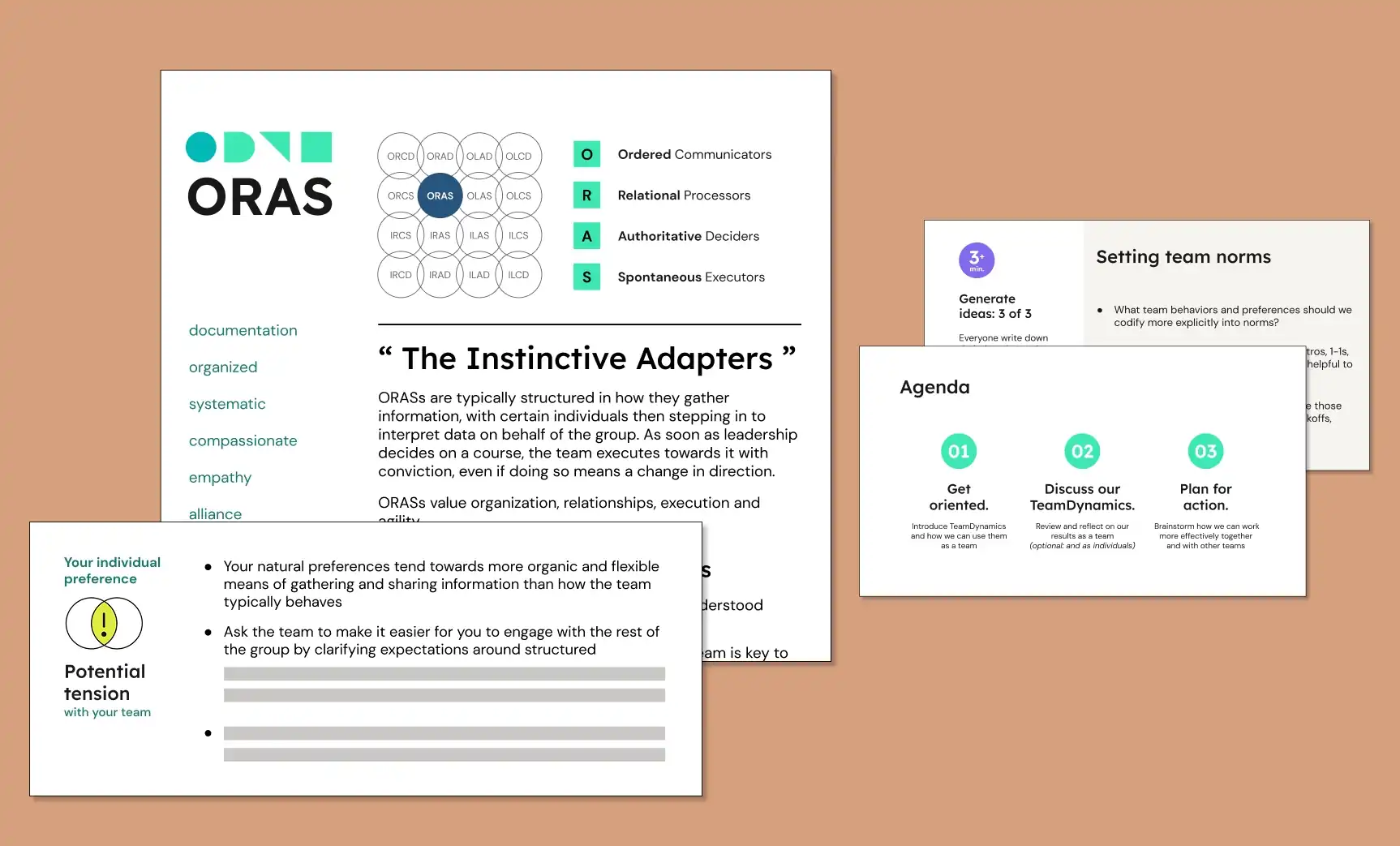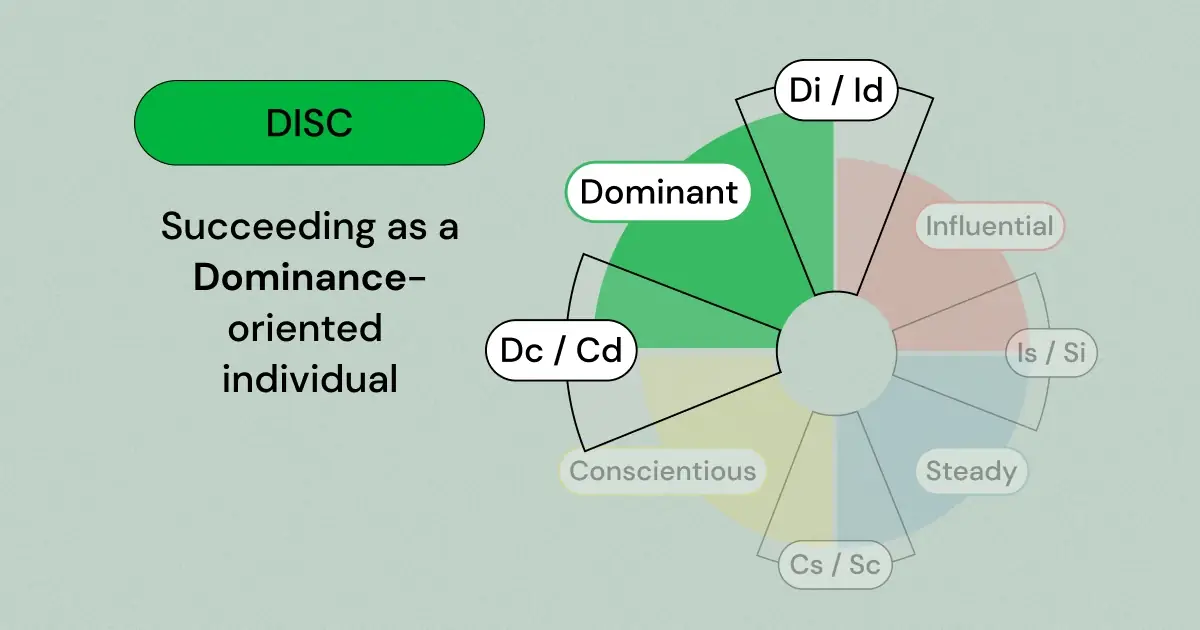Welcome to the world of the Kolbe A Index, where unlocking your team's full potential is just a test away! If you're part of a dynamic team, whether it's crafting cutting-edge marketing strategies, innovating in a tech startup, or solving complex problems in a consulting team, understanding each member's innate strengths is crucial. That's where the Kolbe A Index shines.
So, what is the Kolbe A Index assessment? It's not just another personality test; it's a unique tool that measures your instinctive way of doing things. Think of it as the GPS for navigating how you and your team members naturally work best. By tapping into this insight, you can optimize team performance, enhance collaboration, and drive success in ways you've never imagined.
Looking for something different? Check out the 5 best alternatives to Kolbe A Index.
In this guide, we'll dive into the nuts and bolts of the Kolbe Index A personality test. You'll learn about the Kolbe Personality Assessment format, the intriguing Kolbe A index test questions it poses, and most importantly, how to interpret the results to supercharge your team's efficiency. Ever wondered if there's such a thing as a "perfect score" on the Kolbe A Index? We'll bust some myths around that too. Plus, we'll explore how these insights can guide your career choices, ensuring you're in the role where you'll shine brightest.
Whether you're a seasoned leader or a team member eager to contribute more effectively, understanding the Kolbe A Index is your first step towards achieving unparalleled team synergy. Let's unlock the secrets to a more productive and harmonious work environment, one instinctive talent at a time!
Understanding the Kolbe A Index Test: Decoding the Blueprint of Your Instinctive Strengths
Diving into the Kolbe A Index is like embarking on a fascinating journey into the heart of your instinctive mind. This isn't your typical personality test with predictable questions. Instead, the Kolbe A Index is designed to unravel how you naturally take action when you're free to be yourself. It's about discovering your instinctive strengths, the powerful forces that drive your most productive behaviors.
What Makes the Kolbe A Index Stand Out?
The test comprises a series of unique questions, each crafted to reveal different facets of how you tackle tasks and solve problems. Unlike tests that measure intelligence or personality, the Kolbe A Index zeroes in on your conative abilities - the natural tendencies that govern your actions.
Imagine a scenario where you're faced with a new project at work. Some of us dive right in, relying on improvisation and adaptation. Others plan meticulously, charting out every detail before taking a single step. The Kolbe A Index uncovers this inherent approach, providing a clear picture of your instinctive method of operation.
{{inline-cta}}
The Questions: A Window to Your Instincts
Each question in the Kolbe A Index is a stepping stone towards understanding your natural strengths. These aren't questions with right or wrong answers; they're reflections of your instinctive preferences. How do you organize information? What's your response to new challenges? How do you deal with change? The answers to these questions offer invaluable insights into how you can be your most effective and fulfilled self in a professional setting.
By completing the Kolbe A Index, you're not just answering questions; you're embarking on a journey of self-discovery. It's about embracing your natural talents and leveraging them to enhance your performance in a team. In the upcoming sections, we'll guide you through interpreting these results and applying them to foster a thriving, dynamic workplace.
Deciphering Your Kolbe A Index Results: A Roadmap to Your Instinctive Talents
Congratulations on completing the Kolbe A Index! Now, you're holding a treasure map that leads to a deeper understanding of your instinctive talents. So let's dig in on the topic of Kolbe score interpretation!
Interpreting these results is not just insightful; it's a transformative step towards harnessing your natural strengths in a team environment. Let's break down what these scores mean and how you can use them to amplify your professional success.
Understanding Your Scores: The Four Action Modes
The Kolbe A Index results are presented in four action modes, each representing a different aspect of your instinctive approach:
- Fact Finder: How you gather and process information.
- Follow Thru: Your approach to organizing and systematizing.
- Quick Start: Your preference for dealing with risk and uncertainty.
- Implementor: How you handle space and tangibles.
Each mode is scored on a scale, providing a clear indication of your instinctive preferences. A higher score in one area doesn't mean you're better at it; it simply shows where your natural strengths lie. For example, a high score in 'Quick Start' might mean you thrive in dynamic, fast-paced environments, eagerly embracing change and innovation.
The Fact Finder Dimension: Navigating the World Through Information and Analysis
At the core of every team is a blend of diverse talents and approaches, and the Fact Finder dimension of the Kolbe A Index plays a crucial role in this mix. This dimension is all about how individuals gather and process information, offering vital insights into their approach to problem-solving, decision-making, and planning.
Understanding the Fact Finder Dimension
- Nature of Fact Finder: Individuals who score high in the Fact Finder dimension are often seen as the information gatherers and analyzers of the team. They have a natural inclination towards seeking detailed information, delving deep into subjects, and understanding the nuances of a situation before making decisions. Their approach is methodical, thorough, and often involves a lot of research and fact-checking.
- Roles and Strengths: High Fact Finders are your go-to team members for roles that require in-depth analysis, comprehensive understanding, and careful planning. They excel in positions where attention to detail and a methodical approach are key, such as data analysis, research, project planning, and quality control. These individuals bring depth to your team, ensuring that decisions are well-informed and based on solid data.
- Working with High Fact Finders: Collaborating with high Fact Finders requires understanding their need for thoroughness. They appreciate clear, detailed briefs and the opportunity to ask questions and gather sufficient information. In meetings, they might dive into specifics and prefer discussions backed by data and evidence. Recognizing their need for detail and providing them with the resources to conduct their analysis can lead to more informed and robust outcomes for the team.
- Challenges and Balance: While their thoroughness is a strength, high Fact Finders might sometimes get bogged down in details, leading to analysis paralysis or slower decision-making. Balancing their detailed approach with the dynamism of Quick Starters or the systematic approach of Follow Thrus can create a more harmonious and efficient team dynamic.
- Optimizing the Fact Finder's Talents: To leverage the strengths of a high Fact Finder, assign them tasks that require detailed analysis and strategic planning. Encourage them to share their findings with the team to inform decision-making processes. Also, provide them with tools and resources to aid their research and analysis, such as access to industry reports, analytics tools, or dedicated time for deep dives into topics.
The Fact Finder in You: Embracing Your Information-Driven Approach
If you identify as a high Fact Finder, embrace your natural inclination towards detail and analysis. Your ability to dissect complex information and present it in a comprehensible form is invaluable. Remember, your approach not only aids in making well-informed decisions but also helps in mitigating risks and foreseeing potential challenges.
In conclusion, the Fact Finder dimension is a vital component of any team's success. By understanding and utilizing the strengths of high Fact Finders, teams can make more informed decisions, plan more effectively, and approach problems with a depth of understanding that drives success.
The Follow Thru Dimension: Mastering Organization and Systematic Planning
In the diverse tapestry of team dynamics, the Follow Thru dimension of the Kolbe A Index plays a pivotal role. This aspect of the test reveals how individuals deal with organization, systems, and processes. Understanding this dimension is key to appreciating how certain team members excel in creating order, maintaining structures, and ensuring consistent execution of plans.
Delving into the Follow Thru Dimension
- Nature of Follow Thru: Individuals with high scores in the Follow Thru dimension are the architects of order and consistency in any team. They naturally gravitate towards organizing, scheduling, and maintaining systems. Their approach is characterized by a preference for structured plans, detailed schedules, and a systematic way of tackling tasks.
- Roles and Strengths: Those who excel in the Follow Thru dimension are invaluable in roles that require meticulous planning, systematic organization, and adherence to processes. They thrive in positions like project management, operations, administrative leadership, and any role where systematic planning and follow-through are crucial. Their ability to keep things on track, adhere to timelines, and maintain structured approaches ensures that projects are completed efficiently and effectively.
- Working with High Follow Thrus: To collaborate effectively with individuals high in Follow Thru, respect their need for structure and clarity. They appreciate well-defined roles, clear instructions, and detailed plans. In team settings, they often help in keeping the team organized and focused on the timeline and objectives. Their input is crucial in creating workflows, schedules, and systematic approaches to tasks.
- Challenges and Balance: While their organizational skills are a boon, high Follow Thrus may sometimes struggle with sudden changes or a lack of structure. Their preference for systems can conflict with more spontaneous or fluid approaches. Balancing their need for order with the creativity of Quick Starters or the in-depth analysis of Fact Finders can create a well-rounded team dynamic.
- Optimizing the Follow Thru's Talents: To leverage the strengths of those high in Follow Thru, involve them in the planning stages of projects. Utilize their skills in creating timelines, organizing resources, and setting up systems for monitoring progress. Encourage them to take lead roles in project management and process optimization, areas where their natural talents can greatly enhance team efficiency and effectiveness.
Embracing Your Systematic Nature: The Follow Thru Advantage
If you score high in the Follow Thru dimension, your talent for organization and systematic planning is a significant asset. Your ability to create order from chaos not only helps in achieving goals efficiently but also provides a sense of stability and reliability within the team. Embrace your role as the one who brings structure and order, a crucial element for any team's success.
In conclusion, the Follow Thru dimension is essential for any team seeking to achieve goals in an organized and timely manner. By understanding and utilizing the talents of those strong in this area, teams can benefit from enhanced organization, systematic processes, and a steady approach to achieving objectives.
The Quick Start Dimension: Fueling Innovation and Adaptability
In the dynamic world of team collaboration, the Quick Start dimension of the Kolbe A Index is a catalyst for innovation and adaptability. This dimension sheds light on how individuals respond to change and uncertainty, offering valuable insights into their inclination for risk-taking and improvisation. Understanding the Quick Start dimension is key to harnessing the creative and adaptive energies in your team.
Exploring the Quick Start Dimension
- Nature of Quick Start: Those who score high in the Quick Start dimension are the trailblazers and innovators in any team. They thrive on spontaneity, often preferring to jump into tasks and projects with an eagerness to experiment and adapt on the fly. Their approach is characterized by a preference for intuitive decision-making, a tolerance for risk, and an ability to think on their feet.
- Roles and Strengths: High Quick Starters are invaluable in roles that require creativity, flexibility, and rapid response to changing scenarios. They excel in environments where quick decision-making and adaptability are paramount, such as in creative industries, startups, or roles that require constant innovation. Their natural ability to navigate uncertainty makes them excellent problem-solvers and idea generators.
- Working with High Quick Starters: To effectively collaborate with individuals high in Quick Start, embrace their need for flexibility and openness to new ideas. They thrive in environments where they can experiment and are not bogged down by excessive planning or rigid structures. In team settings, their enthusiasm and innovative approach can inspire and energize the entire group.
- Challenges and Balance: While their adaptability and creativity are strengths, high Quick Starters might sometimes struggle with consistency and follow-through. Their preference for improvisation can conflict with more structured or detailed approaches. Balancing their dynamic energy with the systematic approach of Follow Thrus or the detailed orientation of Fact Finders can create a well-rounded and effective team dynamic.
- Leveraging the Quick Start's Capabilities: To capitalize on the strengths of those high in Quick Start, involve them in brainstorming sessions and roles that require innovative thinking. Encourage them to explore new ideas and approaches, and provide them with opportunities to work on diverse, fast-paced projects. Their input can be particularly valuable in situations that require out-of-the-box thinking and rapid adaptation.
Embracing Your Innate Innovativeness: The Quick Start Edge
If you are a high scorer in the Quick Start dimension, your instinct for innovation and adaptability is a tremendous asset. Your ability to embrace change, think creatively, and act swiftly is crucial in today's fast-paced and ever-changing professional landscape. Embrace your role as the innovator and the adaptable force in your team, driving forward new ideas and approaches.
In conclusion, the Quick Start dimension plays a critical role in any team, especially in environments that value innovation, flexibility, and rapid adaptation. Understanding and leveraging the talents of high Quick Starters can lead to groundbreaking ideas, swift responses to challenges, and a vibrant, dynamic team atmosphere.
The Implementor Dimension: Harnessing Tangible Solutions and Spatial Thinking
In the diverse spectrum of team skills, the Implementor dimension of the Kolbe A Index stands out for its focus on the physical and spatial realm. This dimension reveals how individuals interact with the physical world and use tangible means to solve problems and convey ideas. It's a key element in understanding the practical and hands-on aspects of team dynamics.
Delving into the Implementor Dimension
- Nature of Implementor: Individuals who score high in the Implementor dimension are the tangible problem solvers of any team. They excel in understanding and manipulating the physical world, often thinking and communicating through actions and concrete examples. Their approach is characterized by a preference for working with physical models, prototypes, and tangible tools to express ideas and solve problems.
- Roles and Strengths: High Implementors are crucial in roles that require physical interaction, spatial understanding, and the creation or manipulation of tangible objects. They thrive in fields like engineering, design, art, architecture, and hands-on project management. Their ability to translate abstract concepts into physical models or prototypes is invaluable in visualizing solutions and testing ideas in the real world.
- Working with High Implementors: To collaborate effectively with individuals high in Implementor, recognize their need for tangible expression and hands-on involvement. They appreciate being able to work with physical tools, models, or prototypes and often communicate best through demonstrations or physical examples. In team settings, their practical approach can ground discussions in reality and provide a clear, tangible perspective.
- Challenges and Balance: While their hands-on skills are a strength, high Implementors might sometimes overlook abstract or theoretical aspects. Their focus on the tangible can conflict with more conceptual or analytical approaches. Balancing their practical nature with the strategic thinking of Fact Finders or the innovative ideas of Quick Starters can create a more comprehensive and effective team dynamic.
- Leveraging the Implementor's Skills: To make the most of the strengths of those high in Implementor, involve them in tasks that require building or creating physical models, prototypes, or designs. Encourage them to take the lead in projects that benefit from hands-on development and physical experimentation. Their skills are especially valuable in situations that require a tangible representation of ideas or concepts.
Embracing Your Practical Creativity: The Implementor's Edge
If you're a high scorer in the Implementor dimension, your ability to think and solve problems in the physical realm is a unique and valuable asset. Your hands-on approach not only aids in making concepts tangible but also enriches the team's problem-solving toolkit. Embrace your role as the practical creator, bringing ideas to life in a way that everyone can see and understand.
In conclusion, the Implementor dimension is essential in teams that require a balance of theoretical and practical skills. Understanding and utilizing the talents of high Implementors can lead to more effective problem-solving, clearer communication of ideas, and a stronger connection between abstract concepts and practical applications.
Applying Your Results: Practical Insights for the Workplace
Your Kolbe A Index results are more than just numbers; they're a guide to maximizing your potential in a professional setting. By understanding your scores, you can tailor your work approach to align with your natural strengths.
If you're a high 'Fact Finder,' you might excel in roles that require detailed analysis and thorough research. On the other hand, if 'Quick Start' is your dominant mode, you could be the team's go-to person for innovative solutions and agile responses to challenges.
Knowing your Kolbe scores also helps in team collaboration. By appreciating the diverse instinctive strengths of your colleagues, you can build a more cohesive and effective team. You'll understand why some prefer detailed plans, while others thrive on spontaneity, creating a work environment that celebrates diverse approaches to problem-solving.
Your Kolbe A Index Results: The Key to Unleashing Potential
As you navigate your professional journey, your Kolbe A Index results are a constant ally, helping you to align your role with your natural abilities. They empower you to work in a way that feels most natural and fulfilling to you. This understanding is not just beneficial for you as an individual; it's a vital component in creating a harmonious, productive, and dynamic team.
In the next section, we'll explore the intriguing concept of a 'perfect score' on the Kolbe A Index and how it relates to team dynamics and personal success.
Debunking the Myth of the Kolbe A Index 'Perfect Score'
The quest for perfection often leads us down a rabbit hole in many aspects of life, and the realm of personality tests is no exception. When it comes to the Kolbe A Index, a common misconception swirls around the idea of a 'perfect score.' Let's set the record straight and explore why in the world of Kolbe, the concept of perfection takes on a completely different meaning.
The Truth About 'Perfect Scores'
- Personalized, Not Standardized: First and foremost, the Kolbe A Index is not a test you can pass or fail. It's a reflection of your natural instincts and how you prefer to take action. Each individual's results are unique to them, making the idea of a universal 'perfect score' irrelevant. What's perfect for you might not be perfect for someone else.
- Embracing Diversity: In the context of team dynamics, the strength lies in diversity, not uniformity. A team where every member has the same Kolbe score would lack the balance of skills and perspectives necessary for effective problem-solving and innovation. The real power of the Kolbe A Index in a professional setting is its ability to highlight and harmonize different instinctive strengths within a team.
Why Your Unique Score Matters
- Valuing Individual Strengths: Your Kolbe A Index score is a badge of your unique strengths and tendencies. Understanding and embracing your natural way of doing things allows you to work in your most effective and satisfying manner. It's about aligning your tasks and responsibilities with your instinctive strengths, leading to better performance and job satisfaction.
- Enhancing Team Synergy: In a team, different Kolbe scores mean a rich tapestry of approaches and talents. For instance, a high Fact Finder can delve deep into research, while a high Quick Start brings innovative ideas. Together, they create a synergy that wouldn't be possible if everyone had the same score. This diversity is what drives successful, dynamic teams.
The Kolbe A Index: A Tool for Self-Understanding, Not Comparison
Ultimately, the Kolbe A Index is a tool for self-understanding and team building, not a metric for ranking or comparison. It's about discovering how you naturally excel and leveraging those instincts to contribute effectively to your team. Forget the notion of chasing a 'perfect score.' Instead, focus on understanding and applying your unique strengths to achieve professional growth and team success.
In the next section, we'll dive into how you can use your Kolbe results to make informed choices about your career path, ensuring you're in roles where you can thrive and make the most significant impact.
Career Navigation: Aligning Your Kolbe A Index Results with Professional Choices
Understanding your Kolbe A Index results is more than just an exercise in self-awareness; it's a compass for navigating your career path. By aligning your professional choices with your instinctive strengths, you can unlock a level of job satisfaction and effectiveness that few ever achieve. Let's explore how it's possible to evaluate careers based on Kolbe score, and how your Kolbe results can be a guiding light in selecting the right career and thriving in your professional journey.
Finding Your Professional Niche Based on Kolbe Results
- Tailoring Your Career to Your Instincts: Your Kolbe A Index score provides invaluable insights into how you work best. For instance, if you score high as a Fact Finder, careers that involve research, data analysis, or strategic planning might be most fulfilling for you. On the other hand, if you're a high Quick Starter, you might excel in roles that require adaptability and quick thinking, like in a fast-paced startup environment.
- Selecting Roles That Match Your Strengths: The key to professional fulfillment and effectiveness is finding roles that align with your natural modus operandi. A high Implementor would thrive in hands-on roles that involve working with physical models or prototypes, while a high Follow Thru would excel in project management or operational roles where systematic processes are valued.
Success Stories: Kolbe in Action
Consider the story of a marketing professional who, after understanding her high score in Quick Start, transitioned from a structured corporate role to a dynamic agency setting, where her adaptability and innovative thinking became her biggest assets. Or the engineer whose high Fact Finder and Implementor scores led him to a successful career in product development, where he could combine his love for detailed analysis with hands-on creation.
Maximizing Your Potential in Team Settings
- Contributing to Team Success: Knowing your Kolbe A Index results can also help you identify how you can best contribute to a team. For example, a high Follow Thru can take the lead in keeping projects on track, while a high Quick Start can be the source of innovative ideas when the team faces new challenges.
- Complementary Skills in Teams: Understanding not only your own Kolbe results but also those of your team members can lead to a more harmonious and productive work environment. It enables the team to leverage each member's strengths and create a balanced, effective team dynamic.
Your Kolbe Results: A Roadmap for Career Excellence
In conclusion, your Kolbe A Index results are more than just an assessment; they are a roadmap for career excellence. By understanding and aligning your professional path with your instinctive strengths, you can achieve greater satisfaction and success in your career. Whether you're just starting out or looking to make a change, your Kolbe results are a valuable guide in your professional journey.
In the next section, we'll delve into how understanding Kolbe results can transform team dynamics, making every group project more effective and enjoyable.
Enhancing Team Dynamics with Kolbe A Index Insights
In the complex puzzle of team performance, understanding each other's Kolbe A Index results is like having a master key. It's not just about knowing how each team member works; it's about creating a synergy that elevates the entire team's performance. Let's dive into how the Kolbe A Index can transform your team's dynamics, whether in a tech startup, a marketing team, or a consulting group.
Leveraging Diverse Strengths for Team Success
- A Symphony of Skills: Imagine a team where each member's unique strengths are not just recognized but actively harnessed. A high Fact Finder brings depth with thorough research, a high Quick Starter infuses energy with innovative ideas, a high Follow Thru ensures projects stay on track, and a high Implementor turns concepts into tangible solutions. This diversity is the secret sauce for a high-performing team.
- Collaboration and Understanding: When team members understand their own and each other's instinctive ways of working, collaboration becomes more effortless and effective. Communication improves as team members appreciate different perspectives and approaches, leading to a more inclusive and productive work environment.
Real-World Impact: Kolbe in Professional Teams
- Case Studies: Consider the tech startup that leveraged its team's diverse Kolbe scores to streamline its product development process, leading to faster and more innovative solutions. Or the consulting team that used their Kolbe insights to assign roles in a way that maximized each member's natural strengths, resulting in more efficient and successful client engagements.
- Problem-Solving and Creativity: In problem-solving scenarios, a team with diverse Kolbe scores can approach challenges from multiple angles. This diversity leads to more creative solutions and avoids the pitfalls of groupthink.
Building a Kolbe-Powered Team
- Strategic Team Formation: When forming teams, consider the Kolbe scores of potential members. Aligning tasks and roles with each member's instinctive strengths can lead to more effective and satisfying team experiences.
- Continuous Improvement: Encourage regular discussions about how team members' Kolbe strengths can be better utilized. This ongoing dialogue fosters a culture of continuous improvement and adaptation.
The Kolbe A Index: A Catalyst for Team Excellence
In conclusion, the Kolbe A Index is not just a tool for individual understanding—it's a catalyst for team excellence. By embracing the diverse instinctive strengths of each member, teams can operate more cohesively, innovate more effectively, and achieve higher levels of satisfaction and success.
Next, we'll wrap up with a summary of the key insights from the Kolbe A Index and how you can apply them to achieve both personal and team growth.
Conclusion: Harnessing the Power of the Kolbe A Index for Team Synergy and Personal Growth
As we wrap up our comprehensive exploration of the Kolbe A Index, it's clear that this tool is more than just a measure of personality; it's a key to unlocking your team's full potential and guiding your personal career trajectory. Whether you're in a tech startup, part of a dynamic marketing team, or navigating the complexities of consulting, the insights from the Kolbe A Index are invaluable.
Summing Up the Kolbe A Index Journey
- A Tool for Self-Discovery and Team Development: We've seen how the Kolbe A Index sheds light on our instinctive strengths, guiding us toward roles where we can naturally excel. From understanding the nuances of the Fact Finder to embracing the dynamism of the Quick Start, each dimension offers unique insights into our working styles.
- The Myth of the Perfect Score: We debunked the myth of a 'perfect score,' emphasizing that the true power of Kolbe lies in understanding and valuing our unique profiles. It's not about reaching an ideal number but about appreciating the diverse strengths that each team member brings to the table.
Applying Kolbe Insights for Career and Team Success
- Career Alignment: Aligning your career with your Kolbe results can lead to greater job satisfaction and effectiveness. It's about finding the niche where your natural talents can shine brightest.
- Enhanced Team Dynamics: In team settings, understanding each other's Kolbe scores fosters a deeper level of collaboration and efficiency. It allows teams to strategically leverage each member's strengths, leading to a more cohesive and productive unit.
Are you looking for a tool to help you understand how your team works and improve its performance? Consider trying TeamDynamics, the personality test for modern teams.
Moving Forward with Kolbe Insights
The journey with your Kolbe A Index results doesn't end here. It's an ongoing process of applying these insights to continuously improve both your professional life and your team's dynamics. Remember, the goal is to create an environment where everyone can operate in their natural mode of action, leading to a happier, more efficient, and more successful team.
Your Next Steps
- Take the Kolbe A Index, if you haven't already, and encourage your team members to do the same.
- Reflect on your results and consider how they align with your current role.
- Initiate discussions within your team about how to best leverage each member's strengths.
- Regularly revisit and apply these insights as your team evolves and takes on new challenges.




.png)











































